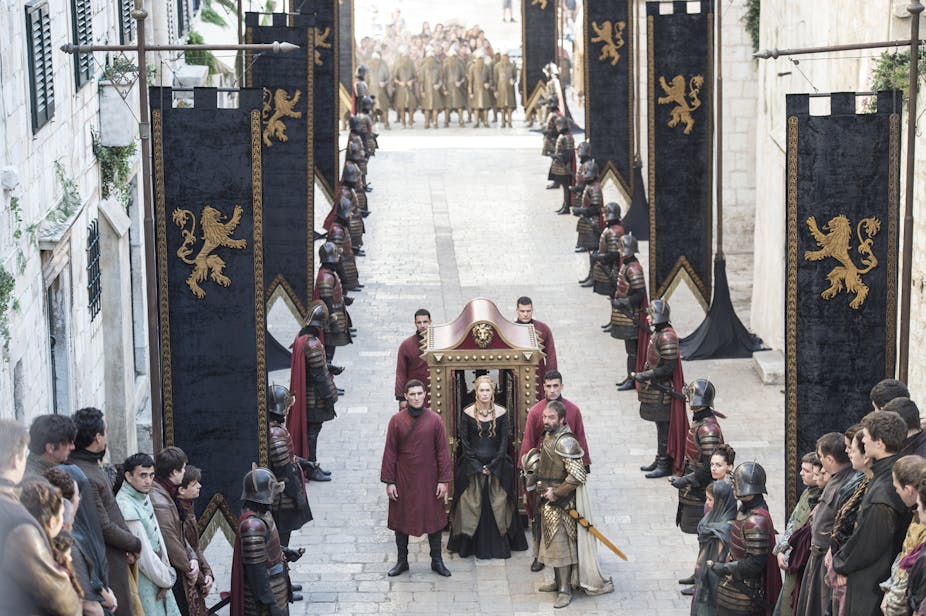This article contains spoilers for the first episode of Game of Thrones, Season five.
“The future is shit, just like the past,” remarks Tyrion, not long after he first appears in season five of Game of Thrones. It’s a line that echoes through the first episode, The Wars to Come. Written by show-runners David Benioff and D B Weiss, the episode is an assured and subtle piece that handles its numerous plot-lines and ensemble cast as deftly as we’ve come to expect from the series.
It’s a comparatively quiet episode – there’s little in the way of sex or combat, and the CGI, while excellent, is used sparingly. Instead, most of the hour is spent with characters who are either explicitly or implicitly beginning to question their future goals, and the rightness of their past convictions.
Perhaps the most unexpectedly likeable and incongruously idealistic character in the episode is Varys. There’s a lot of fun to be had watching the former spymaster trade insults with Tyrion while trying to convince him that Daenerys might be the saviour that Westeros needs. But Tyrion is still determined to drown himself in wine and self-pity – and, even when he agrees to go with Varys, it’s with a cynical resignation that reminds viewers just how much he’s lost and how little faith he has left in the future.

The episode does a fine job of juxtaposing Varys’s (admittedly Machiavellian) optimism with the increasingly precarious situation in Meereen. Daenerys is losing control of her city, and it’s fascinating to watch her conviction in the rightness of her principles gradually erode over the course of the episode. By the end, when she’s forced to flee from her angry and resentful dragons, it’s clear that even she is beginning to doubt herself. Only time will tell if she can regain control of her “children” (both human and dragon).
On a smaller scale, honour-bound Brienne of Tarth has lost her chance to protect Arya – and with it her sense of purpose. She morosely remarks: “All I ever wanted was to fight for a lord I believed in. But the good lords are dead, and the rest are monsters.” In the chaotic world of Westeros, it’s hard not to wonder whether there were ever really any good lords to begin with, and whether there’s any place left for a knight errant. It’s telling that Arya herself is absent from the episode. Presumably, because she’s one of the few characters who has never wavered from her purpose, whether that’s been to get back to her family, or to avenge their deaths.

In an episode that features so many characters questioning their futures and fretting over their pasts, it’s significant that it opens with Game of Thrones’s first flashback: an eerie scene that concerns a young Cersei Lannister and a sinister prophecy of things to come. It’s a move that hints at Cersei’s importance for this season – and which provides an interesting new perspective on her character.
For Cersei’s doom – and the likely deaths of her children – to be foretold so long ago recasts her in a tragic light and helps ameliorate some of the endlessly confrontational aspects of her character. It adds a sad desperation to her actions, but also seems to make her inevitable end all the more certain.
She might be determined to regain her authority in the court of King’s Landing, but she might not have much choice in the matter. The witch’s prophesy raises the possibility that the more she struggles, the more likely she is to destroy herself. For Cersei, both the past and the future look increasingly alike, and increasingly inexorable.

Despite the lack of action, sexual or military, “The Wars to Come” has an obvious drive and determination. The title alone is a clear sign that the drama is moving into its end-game, and throughout the episode there is evidence of long-developing plotlines that might at last be resolved. If Daenerys can hold onto power overseas, then she may also be able to reclaim the Iron Throne. At the wall, Stannis plans to take back the North from the Boltons, and John Snow is looking increasingly like the de-facto leader of the Night’s Watch. Even Cersei’s opening flashback feels like the series reaching back into its past, gathering threads (and fates) together for a final conclusion.
This year, for the first time, it has been confirmed that the television series will overtake George R R Martin’s source novels. Based on this episode, that doesn’t feel like something that either readers or viewers should be concerned about. Previously, the series has picked and redrafted ideas from the books, but now there’s the potential for a type of “reverse-adaptation”.
Martin, Benioff, and Weiss can experiment with ideas in the series that can in turn be refined, or expanded for the novels, in a process that both incarnations of Game of Thrones would benefit from. Free to go its own way, it’s clear that the television series (unlike its characters) has no doubts about where its future lies.

